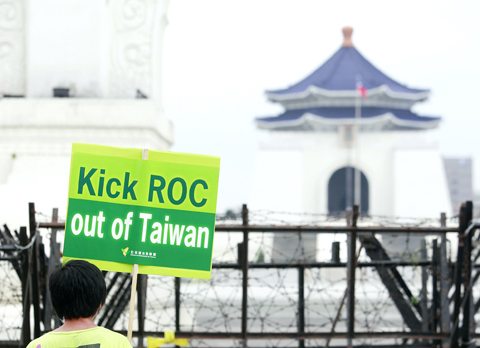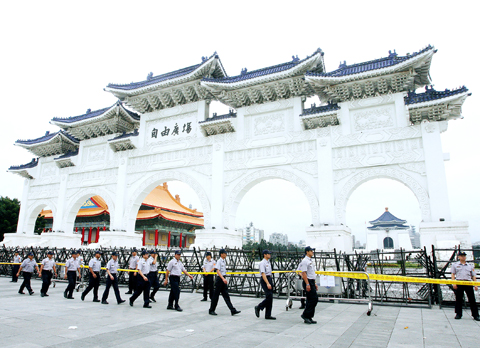The Chinese Nationalist Party (KMT) government yesterday restored dictator Chiang Kai-shek’s (蔣介石) name to National Taiwan Democracy Memorial Hall in Taipei, reversing a move two years ago by the then-Democratic Progressive Party (DPP) administration to remove relics of authoritarianism.
The replacement of the plaque began at about 8:10am after some 300 police officers secured the hall with barricades overnight and put up an official document stating that the hall would be closed for 24 hours for “official business.”
Workers cut the granite plaque bearing the title “National Taiwan Democracy Memorial Hall” that hung over the main building into pieces. The removal was completed by noon, after which workers proceeded to reinstate the Chiang plaque.

PHOTO: NICKY LOH, REUTERS
The replacement project is expected to have cost NT$1.1 million (US$33,000), said the Ministry of Education, which is in charge of the restauration.
In 2007, the DPP administration renamed the memorial National Taiwan Democracy Memorial Hall. It also changed the inscription dazhong zhizheng (大中至正) to “Liberty Square” (自由廣場) and redecorated the hall.
At the time, the pan-blue camp called the removal of Chiang’s plaque illegal, as the legislature had not abolished the Organic Act of CKS Memorial Hall (中正紀念堂組織條例) or passed a proposed act concerning the organization of the Taiwan Democracy Memorial Hall.

PHOTO: CNA
The removal of Chiang’s plaque led to physical clashes between the pan-blue and pan-green camps.
During the pan-blue-dominated legislature’s review of government budget proposals in January, lawmakers passed a resolution saying that the ministry should complete reinstatement of the Chiang plaque as soon as possible.
“We decided to reinstate the Chiang Kai-shek plaque today in accordance with the law. We also decided, after gauging the views of opinionmakers in different sectors, to retain the ‘Liberty Square’ inscription,” Vice Minister of Education Lu Mu-lin (呂木琳) told a press conference yesterday.
Lu was referring to the three forums in which academics and experts on politics, sociology, community management and urban development deliberated over how to resolve the controversy surrounding the name of the hall.
“This compromise should contribute to social harmony,” he said.
Lu said the ministry had done everything it could to properly plan and execute the plaque change, adding that on many occasions the ministry had told the public the replacement would take place this month.
“We understand that people have different memories of and emotional reactions to [Chiang], but we also hope that everyone will respect and tolerate different opinions and promote social harmony,” Lu said.
In a press release, the ministry said it supported the creation of a hall to showcase the nation’s efforts at democratization.
“But replacing the Chiang plaque with National Taiwan Democracy Memorial Hall in an illegal and undemocratic fashion was not a manifestation of Taiwan’s democracy. Instead, it was ironic,” it said.
DPP Taipei City Councilor Chuang Ruei-hsiung (莊瑞雄) was forcefully evicted after he slipped through the barbed wire barricades. A small number of pro-independence supporters shouted “police violence” and “death to Dictator Ma” as police took him away.
At 2pm, only 11 protesters remained at the sit-in, including two Buddhist monks, an elderly man and a small child.
Screaming anti-Ma slogans, protesters compared Ma to Adolf Hitler and said the KMT government was no different from the Nazi Party in its oppression of Taiwanese.
“If the KMT really believes that what it is doing is righteous, then why does it have to remove the plaque like a thief in the middle of the night?” said Peter Wang (王獻極), a leading member of the Taiwan Nation Alliance.
The protesters laid out banners showing pictures of the execution orders signed off by Chiang during his reign.
Two American tourists who declined to give their names asked why there were so few protesters Chiang was the cruel dictator many have accused him of being.
“If someone was to erect a statue of a Ku Klux Klan leader in the US, you bet you would for sure see a huge turn out of demonstrators, both black and white folks,” one said.
Wang said he rushed to the memorial after learning about the change on TV, adding that this probably accounted for the low protester turnout.
Executive Yuan Spokesman Su Jun-pin (蘇俊賓) said that the Executive Yuan respected due procedure and differing opinions.
KMT Legislator Shuai Hua-ming (帥化民) lauded the ministry’s move, saying it was following legislative resolution.
DPP Chairperson Tsai Ing-wen (蔡英文) condemned the change, saying the party could not condone a “measure under which the nation’s public assets are used to commemorate a dictator who slaughtered his own people.”
Chiang was responsible for the massacre that began on Feb. 28, 1947 — known as the 228 Massacre — in which as many as 20,000 people were killed by KMT troops.
“President Ma Ying-jeou (馬英九) said renaming CKS Memorial Hall was a public issue that should be decided by the public. But his government … replaced the hall name in sneaky fashion,” Tsai said.
DPP Legislator Wang Sing-nan (王幸男) told a separate press conference that Ma’s paying tribute to Chiang and restoring the name to CKS Memorial Hall would spark ethnic controversy and rub salt on Taiwan’s historical wounds.
Chuang criticized the Taipei City Police Department for wasting public resources by mobilizing at least 600 officers to fend off protesters.
Aside from 600 officers deployed at the hall, Zhongzheng First Police District Director Chen Ming-cheng (陳銘政) said there were around 300 others in the nearby area, including all MRT exits.
Chen said that the number of officers deployed was “completely in line with protocol.”
“Out of concern over possible riots, CKS hall management asked Taipei City police provide the necessary assistance,” he said, confirming that the district had received the request on Sunday.
Taipei Mayor Hau Lung-bin (郝龍斌) said later yesterday that the police deployment was one-tenth the size deployed when then DPP government renamed the hall, although police in 2007 said there were around 600 officers deployed. Hau also said the hall was under the jurisdiction of the Ministry of Education and city police were merely responding to a request.
Japanese tourist Emi Fukuda and her companions said yesterday they were disappointed when they realized tourists were barred from entering the memorial.
ADDITIONAL REPORTING BY RICH CHANG AND STAFF REPORTER

CHAOS: Iranians took to the streets playing celebratory music after reports of Khamenei’s death on Saturday, while mourners also gathered in Tehran yesterday Iranian Supreme Leader Ayatollah Ali Khamenei was killed in a major attack on Iran launched by Israel and the US, throwing the future of the Islamic republic into doubt and raising the risk of regional instability. Iranian state television and the state-run IRNA news agency announced the 86-year-old’s death early yesterday. US President Donald Trump said it gave Iranians their “greatest chance” to “take back” their country. The announcements came after a joint US and Israeli aerial bombardment that targeted Iranian military and governmental sites. Trump said the “heavy and pinpoint bombing” would continue through the week or as long

TRUST: The KMT said it respected the US’ timing and considerations, and hoped it would continue to honor its commitments to helping Taiwan bolster its defenses and deterrence US President Donald Trump is delaying a multibillion-dollar arms sale to Taiwan to ensure his visit to Beijing is successful, a New York Times report said. The weapons sales package has stalled in the US Department of State, the report said, citing US officials it did not identify. The White House has told agencies not to push forward ahead of Trump’s meeting with Chinese President Xi Jinping (習近平), it said. The two last month held a phone call to discuss trade and geopolitical flashpoints ahead of the summit. Xi raised the Taiwan issue and urged the US to handle arms sales to

BIG SPENDERS: Foreign investors bought the most Taiwan equities since 2005, signaling confidence that an AI boom would continue to benefit chipmakers Taiwan Semiconductor Manufacturing Co’s (TSMC, 台積電) market capitalization swelled to US$2 trillion for the first time following a 4.25 percent rally in its American depositary receipts (ADR) overnight, putting the world’s biggest contract chipmaker sixth on the list of the world’s biggest companies by market capitalization, just behind Amazon.com Inc. The site CompaniesMarketcap.com ranked TSMC ahead of Saudi Aramco and Meta Platforms Inc. The Taiwanese company’s ADRs on Tuesday surged to US$385.75 on the New York Stock Exchange, as strong demand for artificial intelligence (AI) applications led to chip supply constraints and boost revenue growth to record-breaking levels. Each TSMC ADR represents

State-run CPC Corp, Taiwan (CPC, 台灣中油) yesterday said that it had confirmed on Saturday night with its liquefied natural gas (LNG) and crude oil suppliers that shipments are proceeding as scheduled and that domestic supplies remain unaffected. The CPC yesterday announced the gasoline and diesel prices will rise by NT$0.2 and NT$0.4 per liter, respectively, starting Monday, citing Middle East tensions and blizzards in the eastern United States. CPC also iterated it has been reducing the proportion of crude oil imports from the Middle East and diversifying its supply sources in the past few years in response to geopolitical risks, expanding